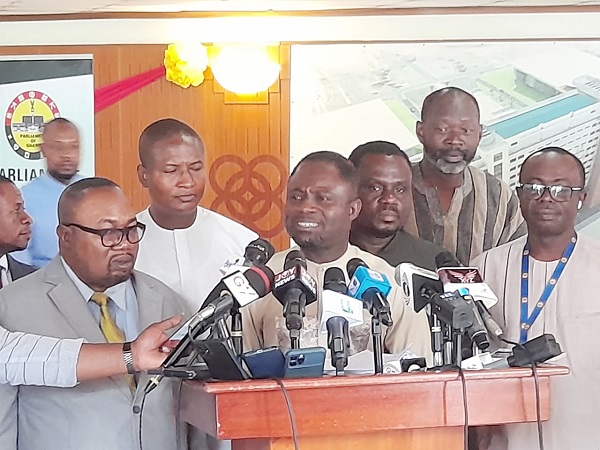
Deliver vaccines to save lives — Minority
The Minority in Parliament has said the shortage of vaccines in the country should be treated as an emergency and must not be swept under the carpet.
At a press conference in Parliament House yesterday, addressed by their spokesperson on Health, Kwabena Minta Akandoh, the Minority said, “This is not the time for big English and complex explanation.
“The drugs should be delivered to the people of Ghana to save the lives of infants,” the spokesperson said.
He added: "Currently, all our children are at high risk. All we are interested in is that tomorrow by this time, the vaccines have been delivered and distribution has started."
Mr Akandoh, who is the Member of Parliament for Juaboso, said the situation was worrying because the vaccines were not over-the-counter medicines, which could be purchased by anyone.
"These are very sensitive and highly protected products controlled by organisations and states," he stated.
Earlier, the Minister of Health, Kwaku Agyeman-Manu, was scheduled to address the House on the current situation and financing module but failed to do that.
Indeed, he was in the chamber together with the Minister of Finance, Ken Ofori-Atta, who was also scheduled to appear to answer questions.
Although their coming was captured on the Order Paper and members were waiting with bated breath, that did not materialise, and no explanation was given.
Failure
Mr Akandoh said the shortage of vaccines demonstrated the failure of the government to act.
He said children should not be punished for the "sins of politicians" especially the President, his vice and the health minister.
Financing
Mr Akandoh said per the financing module, the Government of Ghana financed only three childhood diseases - tetanus, measles and polio - while the Global Alliance for Vaccines and Immunisation (GAVI) financed the other 10 childhood diseases.
The MP said, although the government was still owning GAVI, the organisation continued to finance the other 10 childhood diseases.
He indicated that even with the three, the government was still not able to meet its obligation.
Mr Akandoh stated that GAVI was considering withdrawing completely from financing because Ghana claimed to be a middle-income country.
"Every year, we pass the National Health Insurance Fund allocation formula. An allocation of about GH¢72 million was made in 2022 to procure the vaccines.
"And although the money has been released, it still beats my imagination why there are shortages," he said.
He said the country started experiencing a vaccine shortage in October, last year, and wondered why no action had been taken.
"This is unacceptable and unpardonable," he added.
According to him, the planning for vaccines was usually done a year ahead and expressed shock at why this should happen.
Influx
Mr Akandoh said with the current instability in neighbouring Burkina Faso and the influx of mothers and their children into the northern part of Ghana, the situation could be aggravated.
What is even more dangerous, he said, was that there was no law banning or inspecting their vaccination cards before entering the country.
"It is the reason we should treat it as an emergency," he added.
